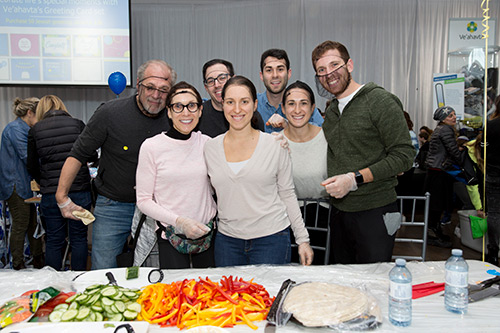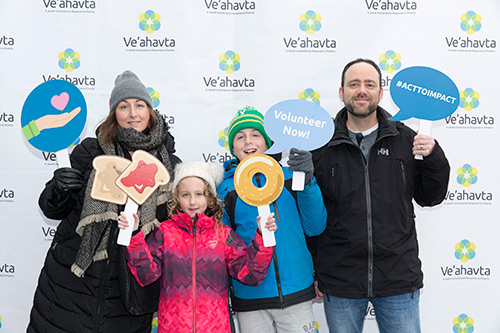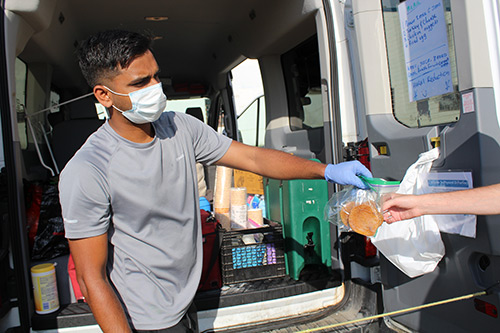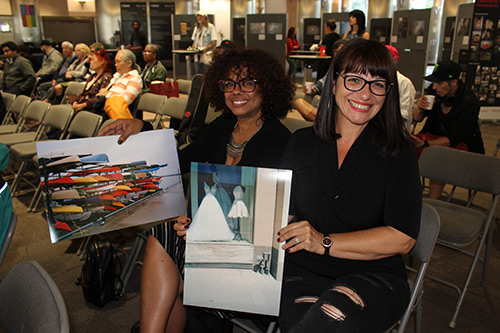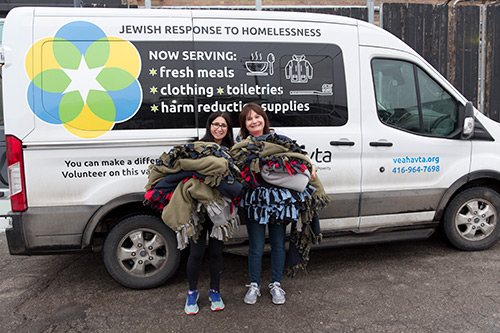Ve’ahavta—Hebrew for “and you shall love”—is a Jewish organization in Toronto serving people of all faiths and backgrounds who have been affected by homelessness. Our high-impact programs help people move from instability to self-sufficiency and fill a service gap by focusing on the whole person to develop the skills and self-confidence necessary for employment.
Ve’ahavta provides volunteers with face-to-face opportunities to make a difference in someone’s life. These experiences are transformative for participants and volunteers alike, fostering connection and building empathy across our community.
Founded twenty-four years ago by Avrum Rosensweig, Ve’ahavta was formed as a Jewish response to the question: What are we expected to do in the face of the suffering and hardship of others? Recognizing that Judaism calls on us to provide more than words and prayers, what is the action that Judaism asks us to take?
Drawing from the teachings of the Torah, our name, Ve’ahavta, is derived from the commandment “And you shall love your neighbour [or the stranger] as yourself.” Repeated thirty-six times throughout the Torah, this commandment to care for the stranger as you would care for yourself is the command to be empathetic—to “do” empathy. It is empathy as verb.
If loving the stranger is the command to empathy, Tikkun Olam, the concept that each of us must repair our world, is the Jewish call to both responsibility and action. A quotation attributed to Rabbi Tarfon captures the concept: “Do not be daunted by the enormity of the world’s grief. Do justly now, love mercy now, walk humbly now. You are not obligated to complete the work, but neither are you free to abandon it.” Tikkun Olam is at once an acknowledgement of our personal responsibility to make the world a better place and a call to action to do it now. Although we are not required to solve the world’s problems, we are required to contribute in some way—our own unique way.
Empathy is defined as the ability to understand and share the emotions of another. It is necessary, but it is not enough by itself. The problem of homelessness is vast and complex. With nearly nine thousand people experiencing homelessness in Toronto alone, it is a problem that overwhelms advocacy groups, policy-makers, and all levels of government. Individuals who care about the problem and want to help often feel hopeless that their contributions will make a difference. Our approach is to raise a sense of empathy for the people experiencing homelessness first and then provide a way for community members to act. As they do so and experience firsthand both the individuals that we serve along with their own effect on them, we create a virtuous reinforcing cycle of action that leads to a sense of empowerment.
At Ve’ahavta, we believe that when people with no specialized training in social services are brought together face-to-face with people who have experienced poverty and homelessness, the beauty of empathy occurs quite naturally. When those same people are given ways to share their unique skills, talents, and experience through meaningful volunteer roles, they are performing Tikkun Olam.
Ve’ahavta’s programs provide a path through which people affected by homelessness can travel at their own pace and based on their own circumstances. Four programming pillars provide the tools, training, and support needed to move from instability toward self-sufficiency. Our programming pillars are as follows:
Relief and Referral. Our mobile outreach van program provides essential supplies, hot meals, clothing, and referrals to community agencies to support people on or near the streets of Toronto. The van operates seven days a week during times when there is a gap in services. Staff follow-up support addresses housing, employment, health, and addiction challenges.
Expressive Arts Programming. Creative arts programs facilitate creative expression, peer connection, and new skill development. Contest programs provide winners with cash prizes and the opportunity to present their work at public exhibits.
Work and Life Skills Training Programs. Programs are offered using a combination of classroom learning, vocational assessments, and individual work with our social workers. Participants are provided with the tools needed to work toward their employment and educational goals.
Paid Work Placement Training Programs. Participants learn job-specific skills while earning money. Programs include public speaking, kitchen management, peer support, and sales wherein participants learn skills while simultaneously earning income and gaining valuable experience in preparation for a return to the workforce.
Each program has been intentionally designed to include direct contact volunteer roles for members of the community. Working with our staff, volunteers can serve on our outreach van, prepare hot meals in the kitchen with program participants in our meal box program, or they can teach workshops in our work and life skills training programs on topics that assist people to prepare for re-entry to the workforce. Roles range from one-time to regular gigs and can be unskilled or using knowledge gleaned from a forty-year career.
Ve’ahavta is an example of how faith-motivated organizations and people bring good into the broader Canadian society. Fuelled by the desire to put our religious teachings into tangible action for our faith community, we have built a social-services organization that is helping to address the long-standing societal problem of homelessness. Although motivated by our faith, we do not engage in any form of proselytizing nor religious practice such as prayer or study of any kind. This creates an inclusive environment for program participants, volunteers, and staff alike who hail from all faiths and walks of life. Our volunteer opportunities are so effective that increasingly they have attracted the interest of people from outside of the Jewish community, who now make up 30 percent of our volunteer community. As Jews, we believe that our task is to hold the teachings of the Torah up as a light to all the nations in terms of justice, kindness, and morality. We do not believe that ours is the only path to G-d, and proselytizing is antithetical to our beliefs. Many in the Jewish community consider themselves to be “secular” Jews who avoid specifically religious activities but feel strongly about the value system inherent in our faith. Ve’ahavta creates a way for the principles of Judaism to come alive through action in a uniquely Canadian way—inclusive and respectful of differences and built on the belief that when we all come together, we can solve even the largest of society’s challenges.

